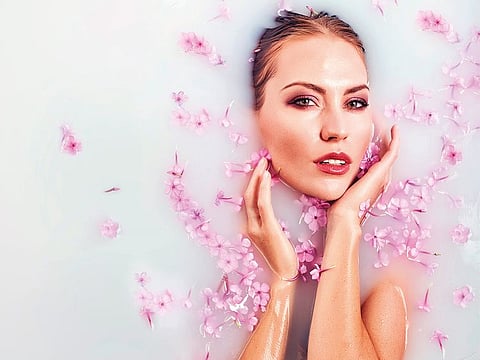Can milk nourish your skin?
The beauty-obsessed have been preaching the benefits of milk in their skincare regime

Highlight
We know milk is great for the body, but the beauty-obsessed have been preaching the benefits of adding milk to their skincare regime
Egyptian queen Cleopatra, renowned for her stunning beauty, bathed in milk for a reason, right? So when Mariah Carey, one of pop’s greatest divas, offered an insight into her beauty regime, it hardly came as a surprise.
When asked by The Guardian to clear the rumour whether she bathes exclusively in French mineral water (as opposed to the basic tap water that us ordinary folks use), she shrugged it off with an even better revelation. “No, I bathe in milk,” she said.
What’s the allure?
Now milk-based skincare products are gaining popularity with a lot of beauty brands using it in their products. So, what is it about the white liquid that has allured people for centuries? One reason for this trend, says Dr Mayur Bhobe, Specialist Dermatologist, Cocoona Centre for Aesthetic Transformation, is a shift towards natural products. “Milk also has ingredients that make it a good moisturising and soothing agent, so it’s being incorporated into skincare products,” he says.
Milk also has ingredients that make it a good moisturising and soothing agent, so it’s being incorporated into skincare products.

With growing interest in nature, people have begun to shun chemicals and industrialised products in food, skincare and even clothes. “Natural and organic products are gaining more popularity and becoming very attractive nowadays,” says Dr Bassant Ezzat Abouyamama, Specialist Dermatologist, Medcare Hospital Sharjah.
Studies have also shown that milk-based products are good for beauty and rejuvenation as well as treating skin problems. “Milk is a natural source of vitamins, mainly B-vitamins, alpha-hydroxy acids, fatty acids, minerals, potent antioxidants, enzymes and proteins,” says Dr Roula Amer, Consultant Dermatologist, American Hospital Dubai. “Alpha-hydroxy acids, which are derived from milk sugars, have been used for rejuvenation since ancient times. Cleopatra was known to bathe in sour milk.”
Natural and organic products are gaining more popularity and becoming very attractive nowadays.

While the turn to natural solutions is good, Vasilisa Charitidi, Cosmetologist at Aesthetics International, Dubai, has a word of caution. “The question, however, always remains how natural these solutions truly are and whether they sometimes have adverse effects instead of helping.”
We all know milk is the magic potion to build strong bones and healthy teeth owing to its calcium and protein content (unless you are lactose-intolerant), but beauty buffs have also labelled milk as one of the super foods of skincare.
Milk is a natural source of vitamins, mainly B-vitamins, alpha-hydroxy acids, fatty acids, minerals, potent antioxidants, enzymes and proteins.

“Studies have proved the magical effects of milk on different skin problems, including diaper rash,” says Dr Abouyamama. “Milk has proved its efficiency as an anti-inflammatory and even as a sun block filtering ultraviolet rays and preventing the harmful effects on skin.”
It also has antiageing properties as the amino acids in milk can improve your skin’s elasticity, explains Dr Bhobe. “It has lactic acid, which acts as a very gentle peel to remove dead skin cells.”
And that’s not all, it also takes away the dirt in your skin. “Milk has the ability to remove the oil-soluble impurities with the help of fat-soluble enzyme lipase and protein-based impurities with the help of protease,” says Dr Amer.
Milk is, at the very best, only the basis of a formula that is enriched with vitamins and trace elements, making up for a very small fraction of the total ingredients. So we all have to be alert and observe the product’s ingredients, going past its product name and marketing punchline.

But wait! Before dubbing it a superfood of skincare, Charitidi says the term could have certain gravitas. “Cosmetic companies do not sell milk,” she says. “Milk is, at the very best, only the basis of a formula that is enriched with vitamins and trace elements, making up for a very small fraction of the total ingredients. So we all have to be alert and observe the product’s ingredients, going past its product name and marketing punchline.”
Hottest ingredients
In recent years, donkey milk and goat milk have also become the hottest ingredients in skincare. Although goat milk was already popular in products, donkey milk takes over. It is one of the stars in the cosmetics world.
Dr Bhobe explains that donkey milk is the closest substitute for breast milk based on its pH level and nutritional make-up and has powerful anti-ageing and healing properties as it contains essential fatty acids.
“These fatty acids lessen the appearance of fine lines and wrinkles and help to regenerate damaged skin,” he says. “It is also effective in healing and soothing minor skin abrasions. It is rich in powerful antioxidants and nutrients.”
Using donkey and goat milk has a historical background. They were used by Hippocrates as a remedy in treatment of arthritis, cough, surgical wounds and ulcers. Queen Cleopatra, of course, used it as a bath to keep her skin soft and moist.
“The fatty acids in goat’s milk have moisturising qualities that keep your skin soft and the high levels of vitamin A improves skin texture and even skin tones,” says Dr Abouyamama.
There are some differences in the composition of goat and donkey milk compared to cow milk, says Dr Amer. This have some additional positive impact on the skin. “Goat’s milk has a pH level similar to humans and is absorbed by the skin with less irritation,” she says.
Another factor that helps in skincare is the composition and concentration of the active ingredients, says Charitidi. “If a product is pure, it can deliver and contribute to healthier skin; if not, then the major differentiating factor will be the price as donkey milk production is much smaller than goat or cow milk productions.”



